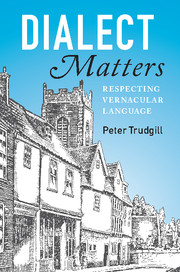Book contents
- Frontmatter
- Dedication
- Epigraph
- Contents
- Foreword
- Acknowledgements
- Map
- Themes
- 1 History: how things came to be this way
- 2 Prescriptivism and other useless pastimes
- 3 Language change: observing and accepting it
- 4 What is happening to words?
- 5 Languages and dialects in contact and conflict
- 6 Respecting English grammar
- 7 Respecting ordinary language
- 8 Sounds and fury
- 9 Respecting local speech
- 10 Grammar: the wonder of it all
- 11 More about words
- 12 Origins
- 13 Accent rules
- 14 Respecting names
- Postscript
- Index
14 - Respecting names
Published online by Cambridge University Press: 05 August 2016
- Frontmatter
- Dedication
- Epigraph
- Contents
- Foreword
- Acknowledgements
- Map
- Themes
- 1 History: how things came to be this way
- 2 Prescriptivism and other useless pastimes
- 3 Language change: observing and accepting it
- 4 What is happening to words?
- 5 Languages and dialects in contact and conflict
- 6 Respecting English grammar
- 7 Respecting ordinary language
- 8 Sounds and fury
- 9 Respecting local speech
- 10 Grammar: the wonder of it all
- 11 More about words
- 12 Origins
- 13 Accent rules
- 14 Respecting names
- Postscript
- Index
Summary
There has been considerable in-migration from other parts of England to the Norfolk area in the last few decades. The incomers make for greater diversity; but they also make for less social cohesion, as well as for decreasing amounts of common knowledge about local culture, history and language on the part of the local population. One consequence of this is increasing amounts of ignorance, confusion and disagreement about local place-names. This section is an attempt to make a small contribution to solving this problem.
Changes vs mistakes
Some people tell me they are puzzled about my stance on language change. On the one hand, I am fascinated by current sound changes, like the two th sounds merging with f and v in “fing” and “bovver”, and I do not disapprove of them. On the other hand, I am against changes in local place-names like pronouncing Heigham, a part of Norwich, as “High-um” instead of the correct “Hay-um”.
My position is easy to explain. The transformation of th is a natural, spontaneous sound change. The disappearance of k before n in all English words like know and Knapton, which started in the sixteenth century, was a natural sound change. The change in all Anglo-Saxon words like cu and nu to Modern English cow and now, which took many centuries, was a natural sound change.
These changes were part of natural linguistic evolution: the sounds of all languages change gradually over time. This mostly happens without anybody noticing, and certainly without anyone intending it; and all instances of a given sound are affected, without exception. Why? Well, languages are just like that.
Sound change is a powerful, inherent, unstoppable feature of human languages. If you could hear Chaucer speaking, you would barely recognise it as English. His version of When April with its sweet showers was Whan that Aprill with his shoures soote, but it sounded like “Hwan that Ahprill with hiss shoo-ress sawta”.
Sound change is part of what gives us different dialects and, ultimately, different languages. If it was not for change, English and German would still be the same language. Even Welsh and Bengali would be the same language: they were 6,000 years ago.
- Type
- Chapter
- Information
- Dialect MattersRespecting Vernacular Language, pp. 196 - 214Publisher: Cambridge University PressPrint publication year: 2016



